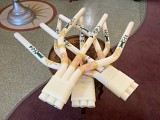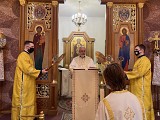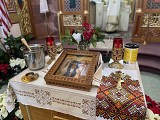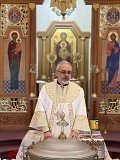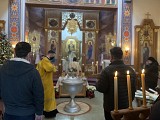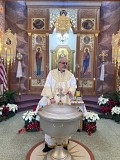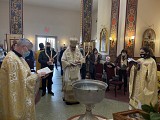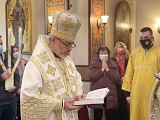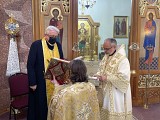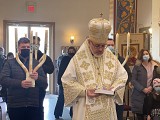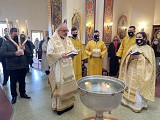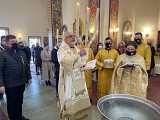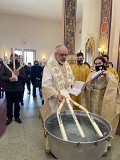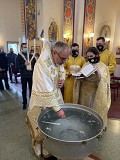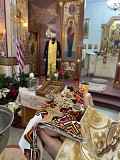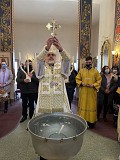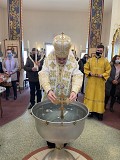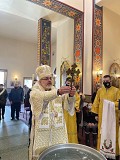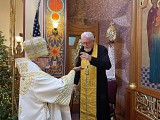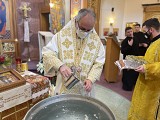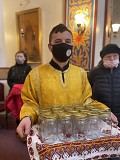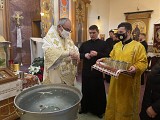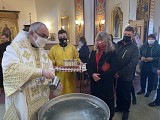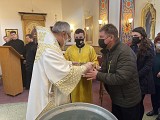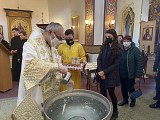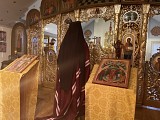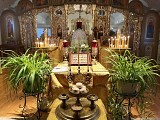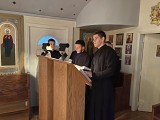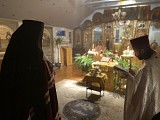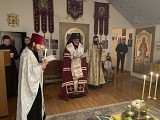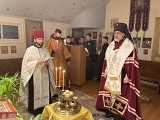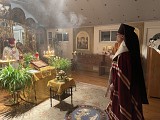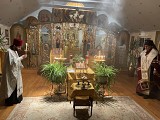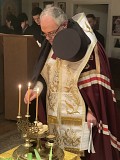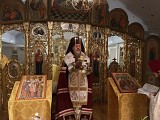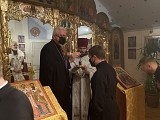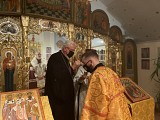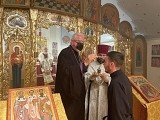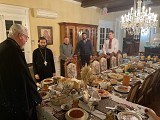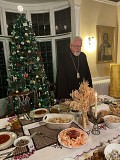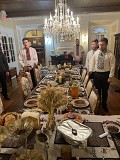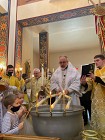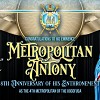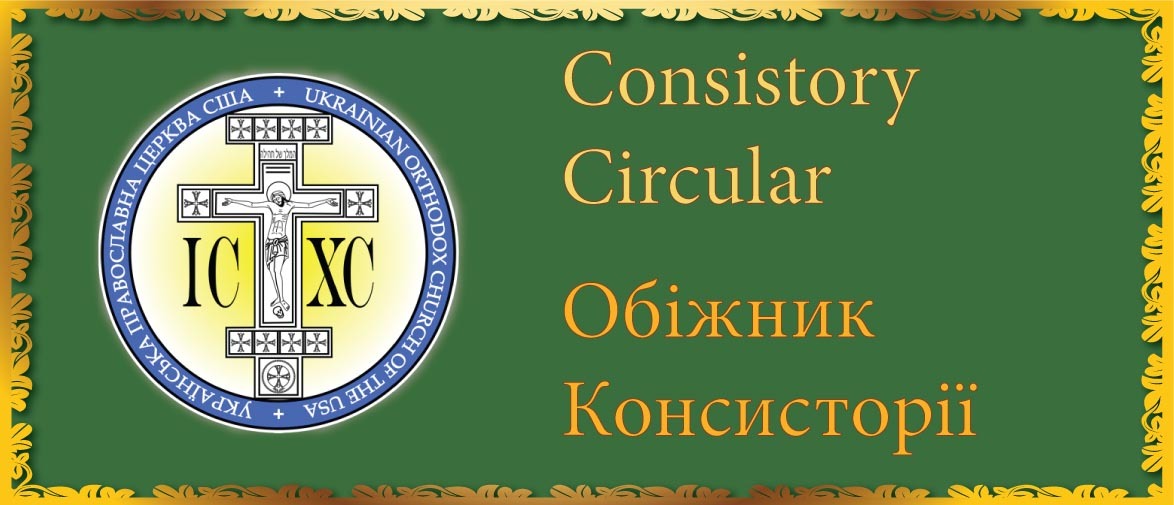Свято Богоявлення Господнього в Духовному Осередку Митрополії УПЦ США
The Holy Theophany is one of the 12 Great Feast Days of the Holy Orthodox Church that follows after the Feast Day of Naming of our Lord Jesus Christ. On that day our Savior was baptized in the Jordan River by St. John the Baptist. “As soon as Jesus was baptized, he went up out of the water. At that moment heaven was opened, and he saw the Spirit of God descending like a dove and alighting on him. And a voice from heaven said, “This is my Son, whom I love; with him I am well pleased.” (Mt. 3, 16-17) This event shows for all of us that God is one in the Holy Trinity. Saint John Chrysostom said: “Why then is this day called Theophany? Because Christ made Himself known to all - not then when He was born – but then when He was baptized. Until this time He was not known to the people. And that the people did not known Him, who He was, listen about this to John the Baptist, who says: “Among you stands one you do not know.” (Jn. 1, 26)
On the eve of the feast-day of Theophany (January 18) Ukrainian Orthodox Christians parishioners from NY/NJ area gathered at St. Andrew the First-Called Apostle Ukrainian Orthodox Memorial Church in South Bound Brook, NJ for the liturgical celebration and the Great Blessing of the Water. This event is part of Theophany/Epiphany celebrations by Orthodox Christians around the world and this year it was liturgically served and observed by the clergy and faithful of the Memorial Church with His Eminence Archbishop Daniel leading the services of the day.
In his sermon, Vladyka Daniel taught the faithful in attendance: “The word “Theophany” Means manifestation or revelation of God and refers to the manifestation of the Holy Trinity at the Baptism of Christ. The feast of Theophany (January 6/19) is considered to be the third greatest feast of the Orthodox Church (after Pascha and Pentecost). It commemorates the Baptism of our Lord by John the Forerunner in the river Jordan and the official appearance of the incarnate Word to the world.
The feast of Theophany is also called: “Epiphany, which means manifestation” and the “Day of Illumination and the Feast of Lights, for Christ, the Sun of Justice has appeared to illumine those who sat in darkness”.
The significance of the Baptism of the Lord is derived from the fact that the lord accepted to be baptized as a human even thought He didn’t need to be cleansed, for He was sinless. As a matter of fact, while John baptized Jesus in the body with waters, Jesus baptized John in the spirit and cleansed his soul. According to St. John of Damascus, The Lord was baptized not because He Himself needed cleansing, but in order “to bury human sin through water” and all of the old Adam, to fulfill the law and to grant us a model and an example of baptism.
At the river of Jordan, John the Baptist testified that Jesus Christ is the Lamb of God and introduced Him as the expected Messiah. This testimony was of great significance in facilitating the beginning of the ministry of Christ and His redemptive work. According to St. Jerome of Stridonium “Even though Jesus had been born of Mary and had already completed thirty years of His life, nevertheless, He was unknown to the world. His identity was revealed at the time when He came to the Jordan to be baptized by John the Baptist.”
At the river Jordan, for the first time, the Triune God revealed Himself fully to the world. The Son in the person of Jesus, the incarnate Word of God; the Holy Spirit in the form of a dove; and the Father who witnesses to the divinity of Christ and proclaims Him to be His only Son: "This is my beloved Son with whom I am well pleased" (Matthew 3:17). This manifestation of the Triune God reveals the fact that the redemptive work of salvation was a collective decision of the Holy Trinity, and officially introduced Christ as the anointed Messiah who came to redeem the world. “The hosts of the angels trembled when they beheld our Redeemer testified to by the presence of the Spirit, while a heavenly voice from the Father cried, saying, Verily, this One on whom the Forerunner places his hands, is my beloved Son in Whom I am well pleased.” (Vespers Service of Theophany)
At the river of Jordan, the nature was sanctified. The decent of Christ into the river Jordan sanctified the waters and entire creation. “Today the waters of the Jordan are changed into healing by the presence of the Lord. Today the whole universe is watered by mystical streams. Today the sins of mankind are blotted out by the waters of the Jordan. Today hath paradise been opened to mankind, and the Sun of righteousness hath shone for us.” (Service of Great Blessing of the Waters)
The descent of Christ into the river Jordan is the first official step of His redemptive work on earth. His Baptism officially starts His salvific journey and foreshadows His death and resurrection for our sakes.
The feast of Theophany reveals that the God of our faith is not an abstract and theoretical God. Rather, He is a living God, who came to earth, entered our human history and became Man so that Man may become divine by grace. Therefore, God continues His perpetual presence and His revelation of Himself in the world; and we continue to experience His Theophany until the next coming.
Every year, at the feast of Theophany, we are invited to open our hearts to receive the Holy Spirit descending from above to sanctify, heal and renew our souls and bodies.
The feast of Theophany is the 2nd oldest Christian feast after Easter. Historical evidence indicates that the Gnosticscelebrated the feast of Theophany as early as the year 140 A.D. St. Clement of Alexandria described the celebration of the baptism of Christ and the night vigil before this Feast, which was spent reading the scriptures. St. Clements writes: “And the followers of Basilides hold the day of His baptism as a festival, spending the night before in readings.” (Stromata, Book I: 21)
Many faithful Christians celebrated the feast of the Baptism of Christ with the Gnostics, which concerned the church, who was vigilant against heretical teachings. Therefore, to protect the faithful from associating with the Gnostics, the church officially adopted the celebration of the Baptism of Christ on January 6/19, along with the feast of His Nativity.
By the year 350 A.D, the feast of Theophany became more officially recognized in the church and took the names Epiphany and Theophany. This fact is evident in the Apostolic Constitutions: “Brethren, observe the festival days; and first of all the birthday which you are to celebrate on the twenty-fifth of the ninth month; after which let the Theophany be to you the most honored, in which the Lord made to you a display of His own Godhead, and let it take place on the sixth of the tenth month.” (Book V:13)
By mid to late fourth century, the church separated the feast of Theophany from the feast of the Nativity of Christ. The celebration of the Feast of Theophany settled on January 6/19, and the Feast of the Nativity of Christ was moved to December 25/January 7 to replace the pagan festival of Sol Invictus "unconquerable Sun."
During the Liturgy numerous faithful received the Most Holy Eucharist in order to be united in Christ and through Christ with God and one another.
The Divine Liturgy was followed by the Great Blessing of the Waters on the Feast of Theophany. The prayers were read, the Old Testament readings were chanted. The dipping of triple candles, exclamations for the dissent of the Holy Spirt upon the waters by His Eminence Archbishop Daniel, the gazing of kids in ought brought so much spiritual joy and uplifting. You could feel the presence of the Holy Spirit.
As water was blessed, Archbishop Daniel made sure that each and everyone in attendance was truly blessed with the newly sanctified water. You could tell that this is His favorite time of the year as many people were drenched with Holy Water.
Taking into consideration the COVID-19 pandemic restrictions, Vladyka Daniel, vested in protective mask and gloves, personally distributed newly blessed Holy Water to each individual in Church, presenting them with a “Holy Water” glass container (generously supplied for by Dobrodijka Oksana Pasakas). Traditionally among Ukrainian Orthodox Christians, the water blessed on the Eve of Theophany is brought home for the consumption and preparation of the traditional Second Holy Supper on the Eve of the feast.
Later in the day, the Three Holy Hierarchs chapel of St. Sophia Ukrainian Orthodox Theological Seminary became a place of the liturgical celebration of the Great Compline for the Feast. His Eminence Metropolitan Antony presided over the service, while Archbishop Daniel assisted by Rev. Fr. Vasyl Pasakas served the liturgical service.
Following the service, everyone in attendance gathered in a social hall of the Seminary for a traditional Holy Supper meal, which consisted of 12 festive dishes, skillfully prepared by the chef of St. Sophia Seminary Pani Mariya Morozovsky, Dobrodijka Oksana Pasakas and the seminarians.
During the meal, Metropolitan Antony offered a short reflection on the meaning of the feast and asked everyone in attendance to remember in prayers those who are not able to share in traditional meal due to illness or Pandemic restrictions.
On January 19, 2021, St. Andrew the First-Called Apostle Ukrainian Orthodox Memorial Church in South Bound Brook, NJ was blessed once again with a celebration of the Divine Liturgy by Archbishop Daniel, for the feast of Holy Theophany. His Eminence concelebrated the services with Very Rev. Fr. Yurij Siwko, Very Rev. Fr. Ivan Lyshyk, Rev. Fr. Vasyl Pasakas and Deacon Valentine Olynyk – and a good contingent of parishioners who admirably made the effort to take off work and school to participate in the feast. The church choir was directed by Dr. Michael Andrec.
Answering in his sermon a rhetorical question “Why should we bless our homes?” Vladyka Daniel stated: “As true Christians, we are often reminded in Scripture to begin whatever we do with a prayer. The Scripture tells us, too, that whatever God created was good, but with “the fall” evil entered the world, corrupting God's creation. So, God the Father, sent His Son Jesus Christ to save the world by effecting a “new creation” which is celebrated at Theophany, specifically with the Great Blessing of Water.
“The consecration of the waters on this Feast places the entire world through its “prime element” of water –in the perspective of the cosmic creation, sanctification, and glorification of the Kingdom of God in Christ and the Spirit.” (The Orthodox Faith, Vol. II, Worship, by Fr. Thomas Hopko). In fact, all the readings, hymns, prayers and actions of the day speak of God's presence in our entire world and universe, His creation. Through water, all the creation is once again sanctified by God, becoming good again, just the way He had intended.
Now, the Feast of Theophany (or Epiphany) commemorates the Baptism of our Lord in The Jordan River by John the Baptist, but the truth is, there is more to it than “the Trinity was manifest” as the troparion says. When Jesus descended into the depth of the river, there occurred a profound upheaval. It is not the one baptized who is purified, for He is spotless, but it is the water that is transfigured and illumined.
The Great Blessing of Water takes place at the church and since our homes cannot be brought there, the church – through the priest – goes to the homes, where the service of blessing is finished with the sprinkling of water in the homes.
In addition to home blessings, we use the Holy Water for drinking whether we are ill or as part of our daily prayer life. On many occasions of the family life, a sip of Holy Water may help to remind us of the blessing that was given “to bestow sanctification” and “unto healing of soul and body.” Moreover, the blessing of homes by Holy Water, maintains the spiritual association between the “family church” and the parish, as well as providing the sharing of God's spiritual gifts.
In conclusion, what does it mean to ask God to bless something? All things in the world have been polluted with the devil. Therefore, God must bless His world again for it to be the way that He wanted it to be. For this reason, God sent His Son Jesus Christ: To bless everyone and everything that He made, to make all things good again.
Brothers and sisters in Christ, do not hesitate to call on your clergy to bring the blessings to your homes. They are willing to bless your homes, either outside, due to Covid-19, or in, and at anytime of year, not limited to Theophany. We all need this blessing.”
The feeling of festal joy was palpable as the hymns of Theophany were sung in the Memorial church; as His Eminence blessed the temple; and as the parishioners prayerfully greeted their archpastor and drank deeply of the newly blessed waters. All appreciated the time Vladyka spent with the parish, manifesting the episcopal ministry through his prayer, teaching, encouragement, and fellowship, and especially on this, the Great Feast of Theophany.
The rich traditions of Theophany, like all sacred Orthodox traditions, are deeply meaningful because at their center is the joyful remembrance of our salvation through Christ’s Baptism. This is communion in practice. It is the communion offered by drinking of blessed water drawn from the same pool – the same water in which we were once baptized, and the same water Christ sanctified when He was baptized by Saint John the Forerunner in the Jordan, two millennia ago.
|
| |||||||||||||
